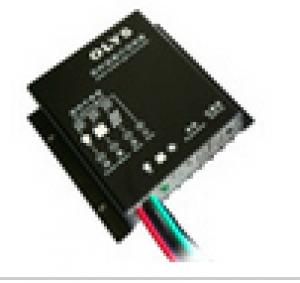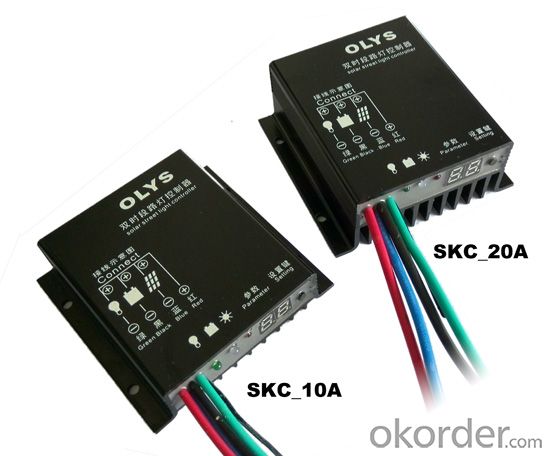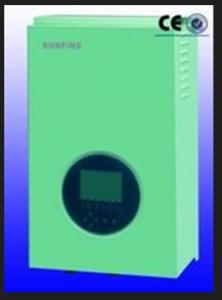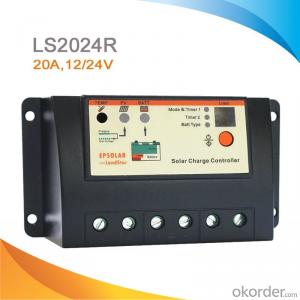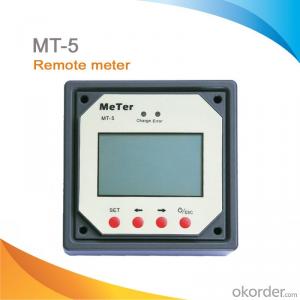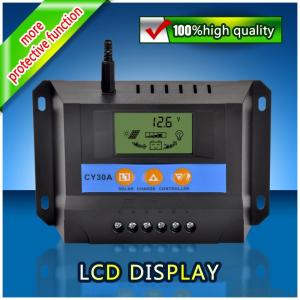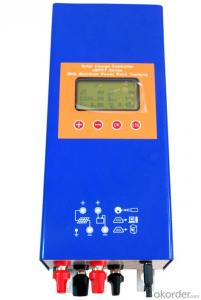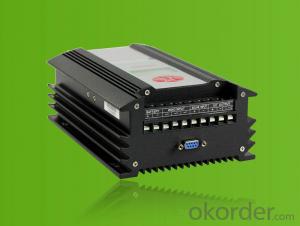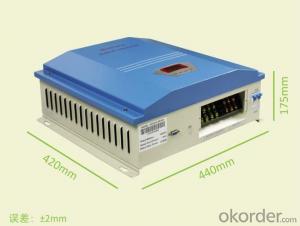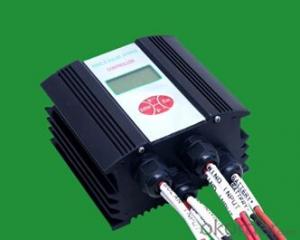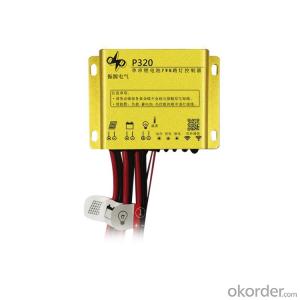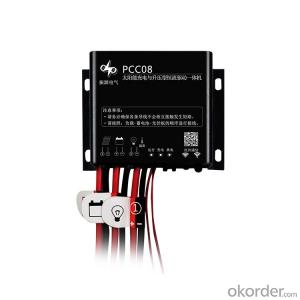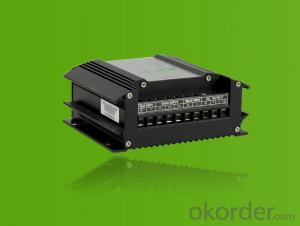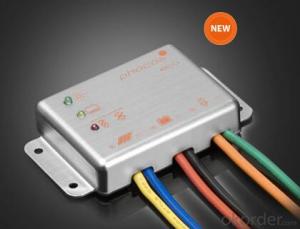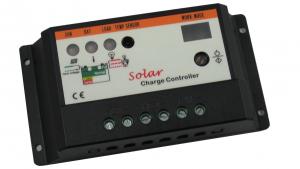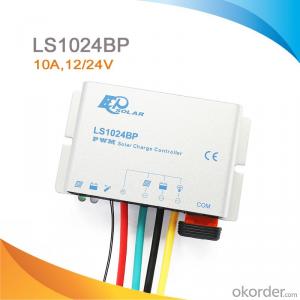Solar Load Controllers - Solar Street Light Controller with Two Time Setting + PWM
- Loading Port:
- Shekou
- Payment Terms:
- TT OR LC
- Min Order Qty:
- 100 unit
- Supply Capability:
- 100000 unit/month
OKorder Service Pledge
OKorder Financial Service
You Might Also Like
(1)adopt advanced MCU design, conforming PWM charging controlling technology, with strong reliability and anti-disturb capability.
(2)Adopt solar energy as power source without waste of regular energy.
(3)Perfect protective and temperature compensate function to prevent the battery from over voltage or shortvoltage.
(4)With perfect capability, to protect acid battery from over discharge
(5)It can restart electrodeless lamp, the controller can restart itself to make sure electrdeless lamp under normal working status when electrodeless lamp is not able to turn on
(6)work under diferent surroundings.
(7)Memory function: startup load mode and main circuit’s working time can be reached by setting with outer keys. After setting, the time will be saved in memorizer. The data will not disappear even battery is disconnected with controller.
Technical parameter
MODEL SKC05 SKC10 SKC15 SKC20
Max.solar panel current 5A 10A 15A 20A
Max.load current 5A 10A 15A 20A
Use voltage 12V/24V,automatic recognition
No-load current ≤6 mA
Overvoltage protection of battery 17V(12V), 34V/24V;
Ambient temperature range: -35℃--+55℃
Boost voltage 14.6V(12V), 29.2V/(24V)
Equalization voltage 14.4V(12V), 28.8/(24V)
Float voltage 13.6V(12V), 27.2V/(24V)
Recharge voltage 13.2V(12V); 26.4/(24V);
Temperature compensation 5mv/℃/2V
Undervoltage of battery 12V(12V); 24V/(24V)
Low voltage disconnect 11V(12V); 22/24V;
Load reconnect voltage 12.6V(12V), 25.2/(24V)
Charge control mode PWM
- Q: How does a solar controller handle variations in solar panel cleaning frequency?
- A solar controller does not directly handle variations in solar panel cleaning frequency. Its main function is to regulate and optimize the charging and discharging of the battery in a solar power system. However, a well-maintained and clean solar panel will generally provide more efficient energy conversion, which can lead to improved battery charging. Therefore, it is recommended to clean solar panels regularly to maximize their performance and overall system efficiency.
- Q: How does a solar controller handle power fluctuations in the grid-tied system?
- The solar controller is a vital part of a grid-tied system that assists in managing power fluctuations from the grid. When power fluctuations occur, such as sudden voltage spikes or drops, the solar controller acts as a mediator to stabilize the power flow between the solar panels and the grid. One of the main functions of a solar controller is to monitor the grid's voltage and frequency. It continuously measures the incoming power and compares it to the acceptable range of values that have been predefined. If the voltage or frequency deviates from the set parameters, the solar controller takes appropriate measures to mitigate the fluctuations. If there is a power surge from the grid, the solar controller uses various protective mechanisms to safeguard the system. It can temporarily disconnect the grid connection or utilize surge protection devices to prevent the excess voltage from damaging the solar panels or other connected equipment. Likewise, if there is a sudden drop in the grid voltage, the solar controller can regulate the power flow to compensate for the lower input. It may adjust the inverter settings or temporarily disconnect the grid connection if the voltage falls below a certain threshold. This prevents potential harm to the solar panels and ensures a stable power supply to the connected loads. In addition, the solar controller plays a critical role in maintaining the stability of the grid-tied system during grid outages. In such cases, the solar controller is programmed to immediately isolate the system from the grid to prevent back-feeding, which could pose a risk to the utility workers attempting to restore power. Once the grid is restored, the solar controller verifies the stability before re-establishing the connection. Overall, the solar controller effectively handles power fluctuations in a grid-tied system by constantly monitoring and regulating the power flow. Its ability to detect deviations, provide protection against surges or drops, and maintain grid stability makes it an essential component for a dependable and efficient solar energy system.
- Q: Can a solar controller be used with a solar-powered boat or marine system?
- Yes, a solar controller can be used with a solar-powered boat or marine system. A solar controller is essential for regulating the flow of energy from the solar panels to the batteries in order to prevent overcharging and optimize charging efficiency. This ensures that the solar-powered boat or marine system operates smoothly and efficiently, maximizing the usage of solar energy.
- Q: What is the difference between a solar charge controller and a solar regulator?
- A solar charge controller and a solar regulator are essentially the same thing. They both refer to a device that regulates the charging of batteries from solar panels. The terms are used interchangeably, and there is no significant difference between them.
- Q: Can a solar controller be used with solar panel cooling systems?
- Yes, a solar controller can be used with solar panel cooling systems. A solar controller is responsible for regulating the flow of power from the solar panels to the batteries or grid, and it also monitors and protects the batteries from overcharging or discharging. In the case of solar panel cooling systems, the solar controller can be used to power and control the cooling mechanism. This ensures that the solar panels are kept at optimal temperatures, which can improve their efficiency and prolong their lifespan. By using a solar controller, the cooling system can be operated effectively and efficiently, maximizing the output of the solar panels.
- Q: Can a solar controller handle power surges from the inverter?
- No, a solar controller is not designed to handle power surges from the inverter. Its main function is to regulate the charging and discharging of the battery bank in a solar power system. Power surge protection is typically handled by surge protectors or surge suppressors installed in the electrical system.
- Q: Can a solar controller be used with a solar-powered nuclear reactor?
- No, a solar controller cannot be used with a solar-powered nuclear reactor. A solar controller is designed specifically to regulate and control the charge and discharge of batteries in solar power systems. On the other hand, a solar-powered nuclear reactor uses nuclear fission to generate electricity, which operates on an entirely different principle and does not require a solar controller.
- Q: What are the safety certifications to look for in a solar controller?
- There are several safety certifications to look for in a solar controller, including but not limited to CE (Conformité Européene), UL (Underwriters Laboratories), and TÜV (Technischer Überwachungsverein). These certifications ensure that the solar controller meets certain safety standards and has undergone rigorous testing to ensure its reliability and compliance with electrical regulations.
- Q: Can a solar controller be used with solar panels that are connected to a solar security system?
- Yes, a solar controller can be used with solar panels that are connected to a solar security system. A solar controller helps regulate the charging and discharging of the batteries connected to the solar panels, ensuring optimal performance and protection for the security system.
- Q: What is the maximum charging capacity a solar controller can handle?
- The maximum charging capacity a solar controller can handle depends on its specifications and capabilities. It can range from a few amps to several hundred amps, depending on the size and type of the solar controller.
Send your message to us
Solar Load Controllers - Solar Street Light Controller with Two Time Setting + PWM
- Loading Port:
- Shekou
- Payment Terms:
- TT OR LC
- Min Order Qty:
- 100 unit
- Supply Capability:
- 100000 unit/month
OKorder Service Pledge
OKorder Financial Service
Similar products
Hot products
Hot Searches
Related keywords

